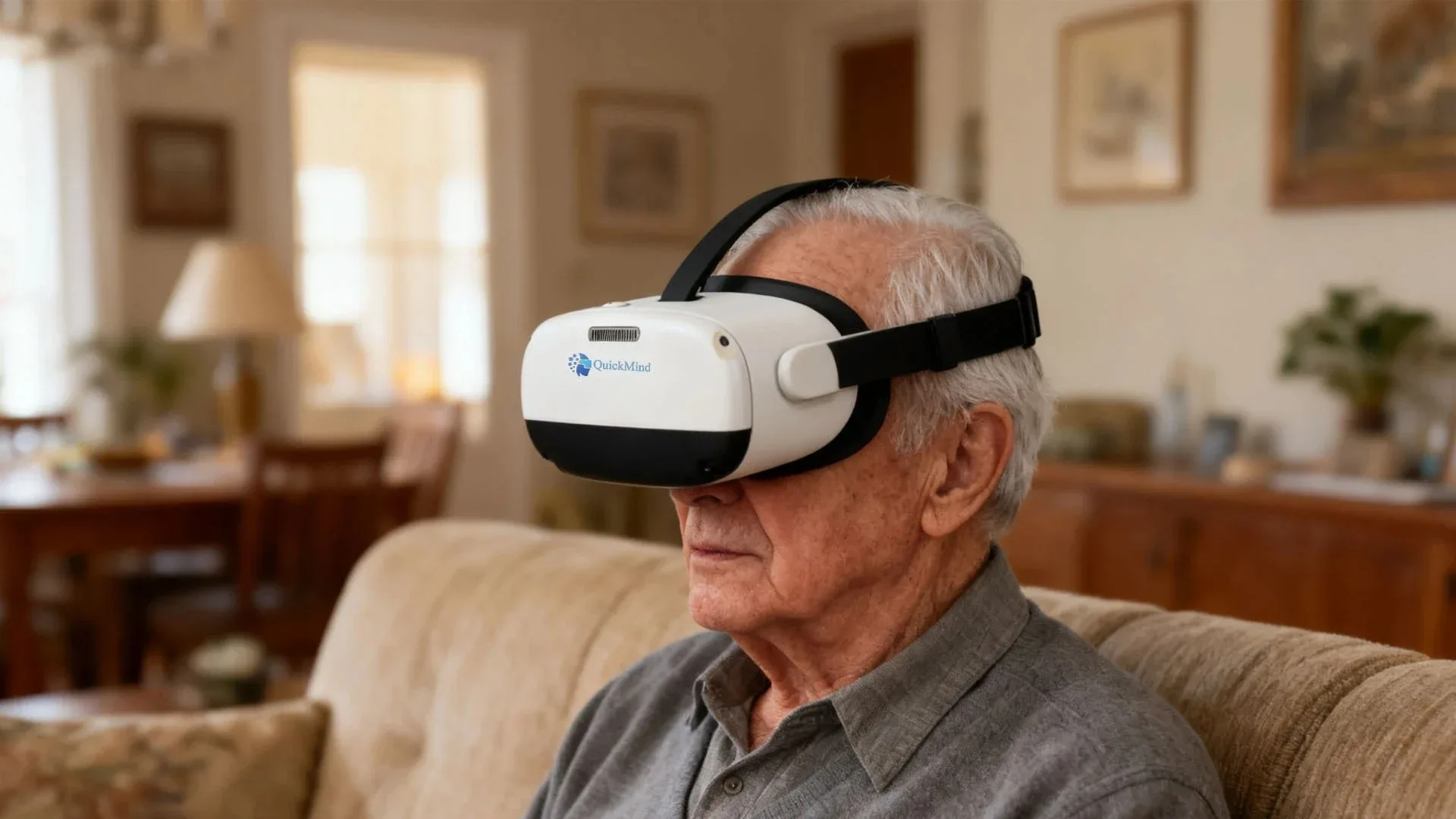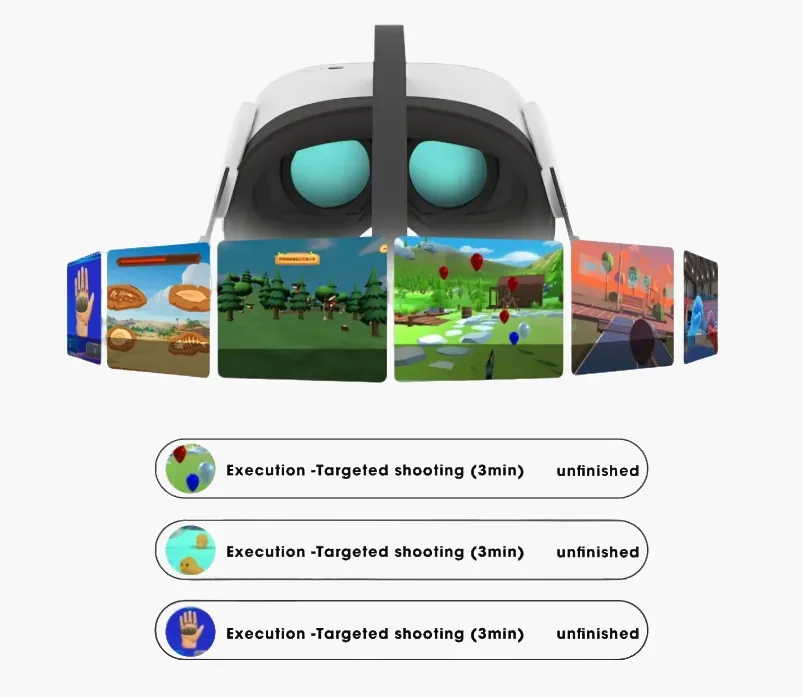
Progressive research demonstrates that VR technology approach can considerably improve the experiences of persons diagnosed with cognitive decline. By transferring them to comforting surroundings, VR offers a exclusive avenue for thought encouragement, feelings management, and community engagement. Numerous investigations have shown that VR therapy can mitigate excitability, concern, and melancholy in dementia patients while also raising their retention, concentration, and interaction abilities.
- VR facilitates people with dementia to retrace dear memories through responsive illustrations.
- Besides, it can furnish a securely controlled and encouraging space for socialization, enhancing a feeling of relationship and belonging.
- Authorities consider that VR therapy has the prospect to reshape dementia care by supplying new and novel paths to handle the multifaceted challenges faced by subjects living with this ailment.
Cutting-Edge Digital Interventions for Alzheimer's Disease
Progressive online therapeutics are gaining recognition in the sector of cognitive enhancement for persons diagnosed with cognitive Alzheimer's illness. These applications leverage computing power to energize brain capability and theoretically curtail the aggravation of the disease. Game-based practices, personalized assistance, and neurological training are some instances of methods being examined in this dynamic field. While experiments are proceeding, digital therapeutics deliver a supplementary avenue for augmenting the welfare of those dealing with the Alzheimer's condition.Addressing Alzheimer's with Virtual Territory Journeys
With respect to clients facing Alzheimer's disease, the ongoing loss of mind function and mental competence can significantly weaken their capability to participate with the external world. This debilitating disease often leads in loneliness, bewilderment, and a limited sense of self. Latest breakthroughs in virtual reality technology unveil a groundbreaking option to combat these complications by formulating immersive scenarios that can activate the brain and strengthen cognitive function.
Virtual scenario worlds engineered specifically for those with Alzheimer's can engulf them in recognizable contexts, such as their old family house or a preferred green space, recalling positive memories and easing anxiety. Through interactive tasks, these virtual worlds can also challenge cognitive abilities like recall, alertness, and solution finding.
The potential benefits of virtual reality in Alzheimer's support are substantial. Early examinations have manifested positive results, with persons reporting improvements in cognitive capacity, mood, and overall quality of life. As this technique advances, it holds the key to modifying the way we approach Alzheimer's disease, granting a new pathway for assistance and encouragement.
Digital Memory Therapy for Alzheimer's Disease
Reminiscence therapy is an established technique used to strengthen cognitive function and psychosocial health in individuals with Alzheimer's disease. This classic form of therapy involves inviting patients to recall past experiences, often through interchange. However, a cutting-edge approach is emerging: VR-mediated reminiscence therapy.
This immersive innovation utilizes virtual reality headsets to shift patients in accurate environments that recall memories from their past. By immersing in these simulated settings, individuals with Alzheimer's can connect with their past in a significant way.
The Potential of Virtual Reality to Improve Memory and Cognition in Dementia
Virtual reality (VR) is emerging as a prospective technology in the fight against dementia, supplying state-of-the-art ways to improve memory and cognition. By constructing immersive platforms, VR can facilitate individuals with dementia retrieve memories, engage in meaningful activities, and boost cognitive aptitudes. Studies have shown that VR interventions can lead to significant improvements in memory recall, attention, and spatial awareness. Moreover, VR provides a safe and beneficial space for individuals with dementia to demonstrate, reducing feelings of isolation and concern.
- In addition, VR can be adapted to individual needs and preferences, enabling amplified levels of connection.
- Acknowledging the chances of VR, more research is needed to fully understand its long-term performance in dementia care.
Recovering Recall and Connections: Virtual Reality's Social Benefits in Alzheimer's
Simulated digital experiences is emerging as a state-of-the-art tool in the area of Alzheimer's disease. By crafting involving and social realities, VR has the opportunity to rekindle memories, foster social interaction, and enhance the overall quality of life for users struggling with Alzheimer's. One of the most promising aspects of VR is its ability to shift users to beloved places and events from their past. Whether it's a excursion in a childhood home or a imitation of a beloved holiday, these virtual visits can conjure happy memories cognitive function reheablation and reinforce cognitive skills. Furthermore, VR can support social interaction by associating individuals with others who share similar preferences. This can be particularly constructive for people with Alzheimer's who may encounter obstacles with traditional social connection. By developing a safe and absorbing virtual space, VR can lessen feelings of isolation and loneliness, which are common among persons affected by Alzheimer's. Overall, VR holds immense promise for transforming the lives of individuals with Alzheimer's by restoring memories, repairing connections, and boosting their quality of life. As technology goes on evolve, we can expect even more advanced applications of VR in the field of dementia care.Exploiting Cognitive Training: Exploiting VR as Cognitive Aid in Alzheimer's
Simulated immersive settings is rapidly emerging as a breakthrough tool in the realm of cognitive training, particularly for individuals suffering from Alzheimer's disease. By immersing patients in interactive and engaging virtual environments, VR-based interventions can improve cognitive functions such as memory, attention, and problem-solving. These games routinely incorporate elements of storytelling, exploration, and social interaction, making the training process exceptionally satisfying. Studies have shown that VR-based cognitive training can lead to measurable improvements in cognitive performance, hypothetically delaying the progression of Alzheimer's symptoms. Moreover, VR provides a safe and controlled environment for patients to practice new skills and strengthen their confidence.
- Game-centric tactics in VR training can make it very enjoyable and involving for patients with memory problems.
- VR simulations can offer accurate scenarios that encourage and raise cognitive functions.
- Personalized VR experiences can cater to distinct expectations and habits.
Using Simulated Worlds to Aid Dementia Care
Enveloping replicated spaces offer a novel and promising avenue for patients with cognitive decline. These solutions can reproduce familiar environments, allowing those affected by cognitive decline to recollect cherished memories and cultivate a sense of security. By reducing the issues of dementia, VR settings have the capability to enhance quality of life for both clients and their helpers.
- Evaluations indicate that VR uses can effectively impact cognitive function, psychological well-being, and even locomotor abilities in individuals with dementia.
- Moreover, VR creates a safe and organized environment for engagement, reducing the risk of danger.
- What is more, VR can encourage social connections by allowing individuals with dementia to bond in cyber activities with others.
Utilizing Virtual Reality for Early Alzheimer's Identification and Management
Alzheimer's disease exhibits a challenging challenge, often staying hidden in its early stages. Albeit, virtual reality (VR) is developing as a innovative tool for identifying the disease at an early stage. Through immersive virtual worlds, VR can assess cognitive performance in ways that traditional methods are insufficient to. This power allows for prompt management strategies, potentially stalling disease progression and boosting the quality of life for patients with Alzheimer's.
- VR-based assessments can test memory, attention, and spatial awareness in a safe and controlled setting.
- Personalized VR experiences can help patients participate in activities that stimulate cognitive function.
- Immersive VR scenes foster connection and communication for Alzheimer's individuals.
Facilitating Dementia Communication and Interaction Through VR
{In the realm of dementia care, innovative technologies are emerging to upgrade the lives of people affected by dementia. Virtual reality (VR) is one such tool that holds immense opportunity for closing social and communicative divides common in dementia patients. By offering absorbing computer-generated environments, VR can invoke cognitive function, reduce behavioral issues, and ultimately improve the overall well-being of clients affected by dementia.
VR experiences designed for neurodegenerative disease management can range from memory therapy sessions that immerse patients in recognizable historic moments, to interactive games that promote social interaction and cognitive activation. Furthermore, VR has the power to connect people with dementia to support circles, regardless of physical isolation, fostering a sense of community.
- VR can facilitate in reducing agitation and anxiety by providing a calming and focusing environment.
- Investigations have shown that VR interventions can lead to improvements in cognitive function, mood, and social interaction in individuals with dementia.
- As technology moves forward with progress, we can expect even more innovative and productive
